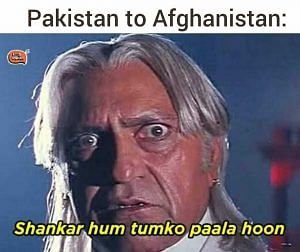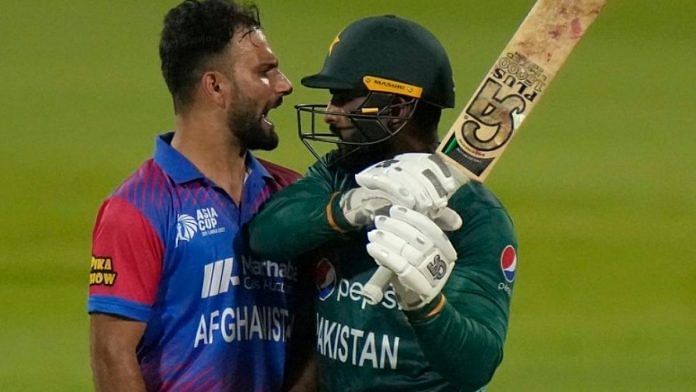With the ongoing Asia Cup, this week England’s Barmy Army got a lot of heat for even suggesting that the Ashes was greater than India-Pakistan matches. This united the crazies of both countries, a rarity these days, over that rather unforgivable thought.
While Indian fans did their ‘gham ghalat’ (to get over grief) in a Twitter space after back-to-back losses, it was the Pakistani infiltrators who requested the esteemed Indian speakers to “please abuse Bajwa”. A request that was denied with, “Why will we abuse Sonam Bajwa?” Seems like there is a visible difference between their Bajwa and our Bajwa. For now, these Bajwas are lost in translation.
Not a gentleman’s game
Not lost in all this was the new Ashes-like cricket rivalry brewing between two ‘friendly’ neighbours, Afghanistan and Pakistan. In a nail-biting, elbow-hitting and bat-raising match Wednesday, Pakistan won by one wicket. But what remains is the altercation between Afghan bowler Fareed Ahmad and Pakistan’s Asif Ali. And, of course, the subsequent trouble in the Sharjah stadium, which saw Afghan fans throwing chairs at Pakistanis.
Older cricket buffs will mention a Javed Miandad and Dennis Lillie coming close to a physical fight in a 1981 Pakistan-Australia match. One provoking the other on the pitch: Lillie kicked Miandad, and in return Miandad lifted his bat to hit Lillie. Then there is the unforgettable Inzamam-ul-Haq rushing to hit a supporter who kept provoking him with: “Aloo, mota aloo, sada aloo (potato, fat potato, rotten potato).” It was 1997, and Pakistan and India were playing in Toronto. Inzamam was banned for two ODIs.
Now Afghan fans want Asif Ali to be banned by the ICC, while Pakistani fans want Afghanistan to be debarred. Not to forget the Afghan Taliban supporters who are busy declaring Pakistan a “terrorist country” that should apologise to the Afghanistan national team.
The fight between Asif Ali and the Afghan bowler💥 Very unfortunate
#PAKvAFG pic.twitter.com/AQzxurWNB7
— Nadir Baloch (@BalochNadir5) September 7, 2022
‘Allah punished Afghans’
This is not the first nor the last time that such an incident occurs among cricket players or supporters. Neither the hooliganism nor the dramatic brushing of an entire nation with racial slurs is condoned. But a push and a shove are enough to irk the cricket hyper-patriots.
Throw the religious angle, racist slurs and racial profiling into the cricket mix, and the post-match “takes” are as problematic as they get. For instance, Shoaib Akhtar was of the exclusive view that the Afghanistan team did “badtameezi” and Allah punished them: “Issi liye Allah ne ek Pathan ko doosre Pathan se chika parwaya (That’s why Allah made one Pathan hit another Pathan for a six).” Unreal. Why invoke the gods to make your lousy point?
His problematic viewpoint is not a first. Earlier, during the 2019 World Cup, Akhtar went on a rant insinuating that most Afghan players had Pakistani identity cards to show they were born in refugee camps in Peshawar. And now that they practice on the grounds of Dehradun and Noida, they should keep in mind the favours granted by Pakistan. Imagine these are our ‘cricketing heroes’ and their views of fellow sportsmen. Now what to expect from lesser mortals?
Also read: Is Pakistan the bad boy of South Asia? Its military Deep State hurts neighbours
Good vs bad namak haraam
The lesser mortals don’t remain far behind. They took to Twitter to inform us why Afghan players did what they did — they are “namak haraam”. It is a vibe, no matter which side of the ideological divide you fall. Pakistanis genuinely consider themselves messiahs of Afghanistan. For that reason alone, Afghans should count all their blessings because they don’t come from heavens above but from their friendly neighbour.
Just look at some of the sentiments in Pakistan: “We gave you space in our country”, “we gave you jobs”, “look at all that we have done for you, still you behave like thankless creatures”, and “shame on you namak haraams.” No, this emotion is not cricket-centric. It is Afghan-centric. Interestingly, in all this talk of “namak haraami”, it is forgotten how billions of dollars in aid were taken in the name of these very Afghan refugees for decades. And later, Pakistan made hay in the double-crossing war on terror. But remember there is always a good “namak haraam” and a bad “namak haraam”.
In a state of oblivion, some Pakistanis questioned the behaviour of the Afghan people towards them. They asked why Afghans are friendly towards Indians and not us, their immediate neighbours. What they forget is that, as self-proclaimed colonisers, the entire Pakistan government backed a regime change that unleashed the Taliban on a country one year ago. Not to forget how Imran Khan and his ministers spent their energy convincing the world how changed, handsome and teddy-bear-like these new Taliban leaders were. Pakistan’s top intelligence chiefs stood in their capital sipping tea and saying, “Don’t worry everything will be okay.” Ask the young Afghan girls trapped in their houses how okay it is. Before that, also ask how okay bringing the Taliban into Afghanistan has been for Pakistan’s strategic depth enthusiasts. Either way, Pakistan’s state is that of Raja sahib in the famous Koyla meme crying out loud: Shankar, hum tumko pala hoon.

Naila Inayat is a freelance journalist from Pakistan. Her Twitter handle is @nailainayat. Views are personal.



